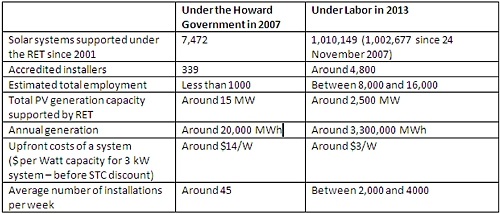Combet's solar snooze button
Yesterday a press release hit my inbox with the headline:
RENEWABLE TARGET SUPPORTS 1 MILLION SOLAR ROOFTOPS
Yawn was my initial response. Climate Spectator had already covered this story two weeks earlier. But it came from none other than Climate Change Minister Greg Combet’s office. Intrigued as to why on earth they were two weeks late to a good news story the Howard government would have been all over, I resisted the temptation to delete the email, and clicked through.
Lo and behold laid out before me was a collection of statistics on the spectacular growth of solar PV since Labor came to power in 2007 and summarised in the table reproduced below.
Solar PV industry statistics under Howard government vs Labor government

Source: Greg Combet (2013) media release – Renewable Energy Target supports 1 million solar rooftops – 22 April 2013
It is an incredible success story, yet we’ve heard so little from Combet, or the government more generally, boasting about it. It’s not as if this success story only just materialised, Climate Spectator (and Renew Economy it should be said) has been pointing-out similar statistics for well over a year.
Instead when Combet has talked about solar PV, it’s often been more in negative terms, citing out-of-date figures on the high cost of abatement from solar PV to berate the Opposition’s Direct Action policy. And then when the government finally spruiks its success, it’s two weeks late to the party, such that most media would have ignored the press release.
Yet solar PV is incredibly, almost irrationally, popular with the electorate. In any survey you care to mention asking people which source of energy they prefer, solar comes on top every time with approval ratings in realm of 90 per cent.
Such is its popularity, one Coalition insider told me Tony Abbott’s office is fixated on it due to the favourable polling and focus group responses it receives. Hence the Coalition’s retention of a 1 million solar roofs rebate plan that is completely redundant.
So why has Combet and the government more generally been so reluctant to promote the solar success story?
There’s two reasons I can fathom.
The first is a perception that solar PV is symbolic green trinket for the rich. The installation data over the past three years shows this stereotype is completely incorrect, but old myths can be hard to budge.
Given Combet’s background, he probably got into politics out of a concern for protecting and assisting the vulnerable and less powerful. Helping the rich save money on their electricity bill isn’t likely to be the kind of thing that gets him out of bed in the morning.
The second reason is the government has become so focussed on defending the economically pure approach to reducing emissions through a carbon price that they couldn’t see a direct-action political gift staring them in the face.
The government was right to prioritise the implementation of an economy-wide carbon price that encourages all the options for reducing emissions. The fact that it favours no particular technology is its greatest strength, but also a major electoral weakness. That the carbon price favours no technology in particular makes it intangible and difficult for the electorate to understand. People can understand how a solar panel reduces emissions, the same cannot be said for a ‘technology neutral’, ‘market-based’ price signal.
The government is in severe electoral trouble partly due to negative perceptions about the carbon price. On the other hand the Renewable Energy Target could be an incredible asset but ministers barely talk about it.
Labor has committed to retaining the RET pretty much whole, while the Coalition is refusing to make a similar commitment and instead saying it will review the target (again). This is a clear opportunity for climate change policy to work in the government’s favour.
But they’ll need to stop pressing the snooze button on talking about solar.













